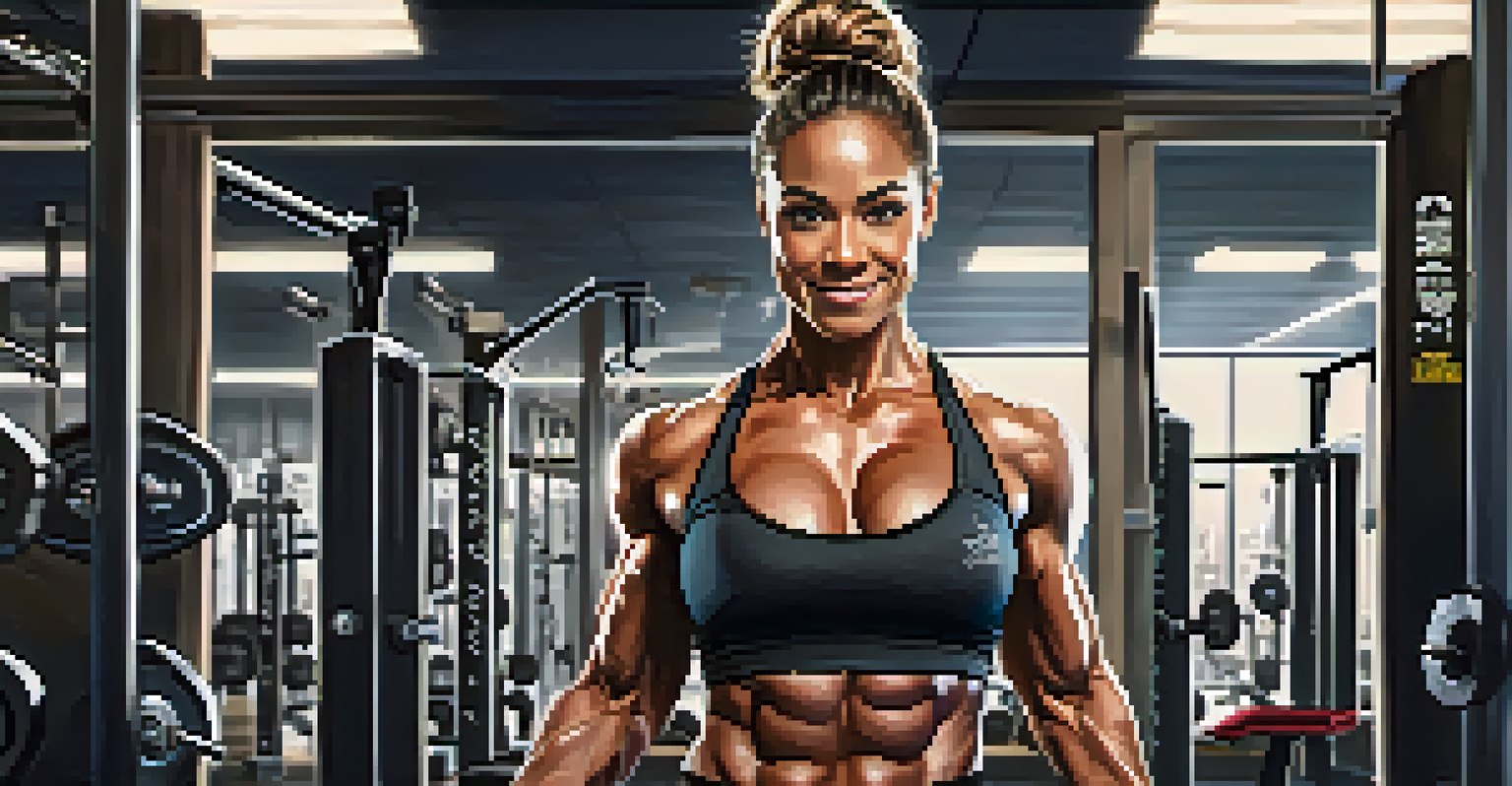Vegan Bodybuilding: A Path to Sustainability

Understanding Vegan Bodybuilding and Its Principles
Vegan bodybuilding revolves around building muscle without any animal products. This approach not only focuses on physical strength but also on ethical and environmental considerations. By choosing plant-based foods, athletes can fuel their bodies while supporting a sustainable lifestyle.
The greatness of a nation and its moral progress can be judged by the way its animals are treated.
At its core, vegan bodybuilding emphasizes whole foods such as fruits, vegetables, legumes, nuts, and grains. These nutrient-dense options provide the necessary proteins and vitamins for muscle recovery and growth. Additionally, many plant-based sources offer fiber and antioxidants, which are vital for overall health.
Many people might think that protein intake is a major concern for vegans, but there are plenty of plant-based sources that can meet these needs. Foods like lentils, chickpeas, quinoa, and tempeh can provide sufficient protein levels for muscle development. With proper planning, a vegan diet can be just as effective as a traditional bodybuilding diet.
The Environmental Benefits of Vegan Bodybuilding
One significant advantage of vegan bodybuilding is its positive impact on the environment. Animal agriculture contributes to deforestation, greenhouse gas emissions, and water depletion. By opting for a plant-based diet, bodybuilders can reduce their carbon footprint and promote sustainability.

Plant-based diets require fewer resources than meat-based diets, making them more sustainable. For instance, it takes around 2,000 gallons of water to produce just one pound of beef, whereas growing a pound of beans requires only about 1,200 gallons. This stark difference highlights the importance of sustainable food choices.
Vegan Bodybuilding for Muscle Growth
A well-planned vegan diet can provide all the necessary nutrients for effective muscle building and recovery.
Moreover, by choosing vegan options, bodybuilders can support local farmers and sustainable agriculture practices. This not only helps the environment but also fosters a healthier food system. Supporting local farms encourages biodiversity and reduces reliance on mass-produced foods.
Nutritional Considerations for Vegan Bodybuilders
When transitioning to a vegan bodybuilding diet, it's essential to consider nutritional balance. Bodybuilders need to ensure they are consuming enough essential amino acids, vitamins, and minerals. This often requires a conscious effort to include a variety of foods in their diet.
You don’t have to be a vegan to be a great athlete, but if you are, you can be a great athlete and help the planet at the same time.
Key nutrients to focus on include protein, iron, calcium, omega-3 fatty acids, and vitamin B12. While protein can be sourced from legumes and grains, iron can be obtained from dark leafy greens and fortified foods. Incorporating a range of foods helps to prevent deficiencies and supports overall health.
Many vegan bodybuilders also find that supplementation can be beneficial. For example, vitamin B12 is primarily found in animal products, so a supplement may be necessary for those on a strict vegan diet. Consulting with a nutritionist can help tailor a plan that meets all dietary needs.
Creating Effective Meal Plans for Vegan Bodybuilders
Crafting a meal plan is crucial for vegan bodybuilders to ensure they meet their nutritional goals. It involves strategically combining foods to maximize protein intake while also focusing on calorie needs. This planning can make a significant difference in performance and recovery.
When creating a meal plan, consider incorporating a variety of protein sources throughout the day. For instance, starting with a smoothie packed with spinach, banana, and protein powder can set a great foundation. Lunch could include a quinoa salad with chickpeas and plenty of veggies for a nutrient boost.
Environmental Impact of Veganism
Choosing a plant-based diet significantly reduces one's carbon footprint and promotes sustainable agricultural practices.
Snacks also play an important role; options like hummus with carrots or a handful of nuts can keep energy levels stable. Remember to adjust portion sizes based on training intensity and personal goals. A well-structured meal plan can be a powerful tool in achieving bodybuilding success.
Common Misconceptions About Vegan Bodybuilding
Despite the growing popularity of vegan bodybuilding, several misconceptions persist. One of the most common myths is that vegans cannot build muscle effectively. In reality, numerous athletes have proven that a well-planned vegan diet can support significant muscle gains.
Another misconception is that vegan diets lack sufficient protein. However, as mentioned earlier, there are plenty of plant-based options that offer adequate protein. Foods like seitan, edamame, and protein-rich grains can easily meet or exceed protein requirements.
Lastly, some believe that vegan bodybuilders must sacrifice taste and enjoyment in their meals. On the contrary, vegan cooking can be incredibly diverse and flavorful, using herbs, spices, and creative cooking techniques. The key is to explore and experiment with different recipes to find what you love.
The Role of Supplements in Vegan Bodybuilding
While a well-rounded diet can provide most nutrients, some vegan bodybuilders may choose to incorporate supplements. This might include protein powders derived from peas, rice, or hemp to help meet daily protein targets. Powders can be a convenient way to boost nutrition, especially post-workout.
In addition to protein, certain vitamins and minerals may require supplementation, particularly vitamin B12. Since this vitamin is primarily found in animal products, vegans should consider a supplement to prevent deficiency. Omega-3 fatty acids can also be supplemented through algae oil, providing a plant-based source.
Nutritional Balance is Key
Vegan bodybuilders should focus on acquiring essential nutrients through diverse food sources and may consider supplementation for specific vitamins.
Ultimately, supplements should complement a balanced diet, not replace whole foods. It's always wise to consult a healthcare provider or nutritionist before starting any supplementation routine, ensuring that it aligns with individual health needs.
Inspiring Vegan Bodybuilders to Follow
Many inspiring vegan bodybuilders have emerged, showcasing the power of plant-based diets. For example, Patrik Baboumian is a world-record-holding strongman who has demonstrated immense strength while adhering to a vegan diet. His journey has challenged traditional views about nutrition and strength.
Another notable figure is Torre Washington, a professional bodybuilder who emphasizes the importance of a vegan lifestyle. He often shares his training and nutrition tips, proving that a plant-based diet can lead to impressive results in the bodybuilding arena.

These athletes not only inspire others to embrace veganism but also promote a healthier, more sustainable way of living. Their successes serve as a reminder that with dedication and the right mindset, anyone can achieve their fitness goals while prioritizing the planet.